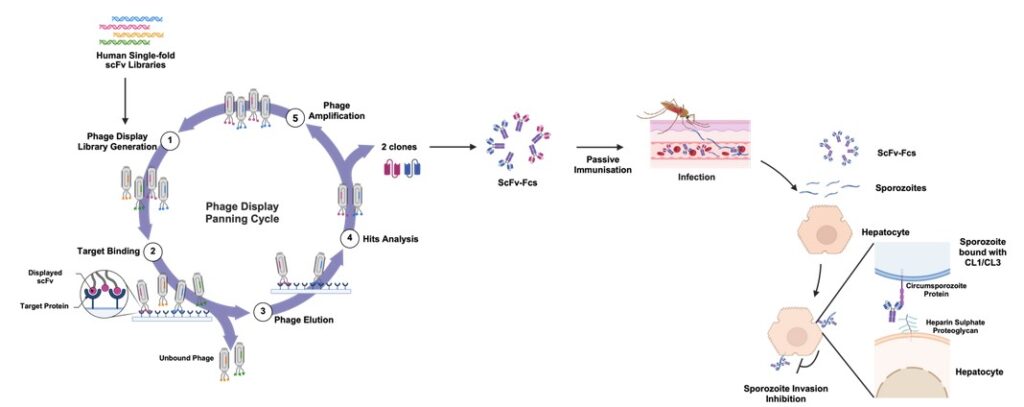Research Summary: We have found that single-chain antibody drugs isolated from a human scFv phage display library screening can be used to target Plasmodium falciparum liver stage surface protein, Circumsporozoite protein (PfCSP) to prevent the parasite infection.
Author interview

Sadaf Parveen is a Research Associate in Dr Pawan Malhotra’s lab at the International Centre for Genetic Engineering and Biotechnology, New Delhi. She completed her Ph.D. from the same lab and works on the phage display library screening to isolate high-affinity binding scFvs against Plasmodium falciparum surface proteins that play a crucial role in parasite infection.
Linkedin: www.linkedin.com/in/sadaf-parveen-84b982279
Lab: Dr. Pawan Malhotra, International Centre for Genetic Engineering and Biotechnology, Jawaharlal Nehru University, India
What was the core problem you aimed to solve with this research?
Malaria remains amongst the most life-threatening tropical infections. Despite the approval of the WHO of two malaria vaccines: Mosquirix (RTS, S) and R21/MMTM, based on the trials in malaria-endemic countries, RTS, S has shown low efficacy in a seven-year follow-up in children. Monoclonal antibodies like CIS43 or L9 have been generated from plasmablasts from radiation-attenuated Pf-SPZ vaccination in controlled human malaria infection (CHMI). Despite passing phase 2 clinical trials, these antibodies were unable to provide complete protection against clinical malaria. These findings suggest the need for an additional prophylactic vaccine or monoclonal antibody drugs.

How did you go about solving this problem?
Plasmodium falciparum Circumsporozoite Protein, PfCSP, is an abundantly expressed surface protein of the sporozoite stage of the parasite. It plays a role in aiding sporozoites to target mosquito salivary glands and development within the hepatocytes. Earlier studies have reported that antibodies against PfCSP can block malaria transmission from mosquitoes to humans. A monoclonal antibody 2A10, isolated against a repeat region of PfCSP, has been shown to block the infection of Pb-PfCSP sporozoites when administered in the host. This has been considered a gold standard monoclonal antibody.
Here, we have reported the isolation of potent antibodies against recombinant PfCSP, rPfCSP, with phage display human antibody library screening. Two high-affinity clones from different germline sequences, CL1 and CL3, were expressed as scFv-Fc full-length antibodies to increase their stability in systemic circulation. These antibodies were checked for their binding affinity for rPfCSP and were shown to have an affinity for the C-terminal region of the protein, an observation different from the previously isolated monoclonal antibodies CIS43 and L9, which bound to the junctional region and minor repeats, respectively. The antibodies were tested for their in vitro and in vivo protective efficacies and showed high efficacies similar to the 2A10 monoclonal antibody. CL1 and CL3 have shown potential applications as antibody drugs in malaria immunoprophylaxis in malaria elimination programmes.
How would you explain your research outcomes (Key findings) to the non-scientific community?
Malaria still remains the most life-threatening tropical infection, and the development of an effective vaccine remains a prime goal of human health. A Plasmodium falciparum antigen known as Circumsporozoite Protein (PfCSP), present on the surface of the liver stage of the parasite, is the target of two vaccines approved by the WHO, RTS, S/AS01, named Mosquirix and R21/Matrix-M. However, these vaccines provide short-lived, moderate efficacy despite considerably reducing malaria burden. To improve the efficacy of these vaccines, we require an additional prophylactic vaccine or monoclonal antibody drugs. In this study, we have isolated the antibodies by screening the bacteria infecting virus, bacteriophages, expressing short-chain antibodies on their surface against recombinant PfCSP and have obtained two antibody clones, CL1 and CL3. These antibodies inhibited the development of infection in mice when they were exposed to the liver-infecting stage of the parasite, the sporozoites. The antibodies have proven to be promising candidates to be employed for combination studies with the existing vaccines.
These therapeutic antibodies are a step for developing an efficacious malaria vaccine that can be used along with the two vaccines which are going to be launched in 2027. — Dr Pawan Malhotra
What are the potential implications of your findings for the field and society?
The development of an effective malaria vaccine has been the priority in the field of malaria since the 1960s. The WHO African Region contributes to the highest malaria burden, and children under 5 years of age are most vulnerable. The approval of two malaria vaccines, Mosquirix (RTS, S) and R21/MM by the WHO, has directed us to the speculation that these vaccines may end malaria. Given the short-lived moderate efficacy of these vaccines, scientists continue to face numerous challenges in controlling and eradicating malaria. Although two monoclonal antibodies, CIS43 and L9, have passed phase 2 clinical trials, they are unable to provide complete protection after a 6-month interval. Also, the conventional method of isolating monoclonal antibodies requires patient compliance, high antigen immunogenicity and time. To address this, we have isolated two high-affinity monoclonal antibodies, CL1 and CL3, against recombinant PfCSP, a major surface protein of sporozoites, which is a part of the two malaria vaccines, with the help of phage display human antibody library screening.
Additionally, expressing these scFvs as full-length scFv-Fc clones comes with the advantage of enhanced stability in circulation, Fc-dependent effector functions and easier purification. Thus, these antibodies have shown high in vitro and in vivo effector functions. Passive immunisation using monoclonal antibodies can be a valuable approach to induce short-term protection against malaria in pregnant women, military personnel, travellers and residents of areas with highly seasonal malaria transmission. Additionally, these antibodies can be used as antibody drugs in combination with existing vaccines in malaria elimination programmes.
What was the exciting moment during your research?
The high inhibitory potential of the antibodies, both in vitro and in vivo, was exciting, particularly because it was similar to 2A10. Observing >90% inhibition of parasite load in mice gave us hope of developing an antibody drug against Plasmodium falciparum made by Indian researchers.
Paper reference: Parveen S, Rath PP, Tabrez S, Khan S, Singh P, Arkam SZ, Verma S, Ahmad S, Singh SK, Junaid IT, Kumar D, Theisen M, Gupta D, Mohmmed A, Salunke DM, Singh AP, Malhotra P. Novel, fully human, anti-PfCSP antibodies with potent antimalarial activity using a phage display based strategy. Vaccine. 2025 Apr 30;54:126993. doi: 10.1016/j.vaccine.2025.126993. Epub 2025 Mar 17. PMID: 40101454.
Explore more
🎤 Career – Real career stories and job profiles of life science professionals. Discover current opportunities for students and researchers.
💼 Jobs – The latest job openings and internship alerts across academia and industry.
📢 Advertise with BioPatrika – Reach the Right Audience, Fast!
🛠️ Services – Regulatory support, patent filing assistance, and career consulting services.




